Hospitality is a unique industry with specific challenges that can’t always wait until the next business day to be solved. If one of your guests has an urgent request, they must have the means to contact your team. Many modern, cloud-based platforms provide you with multiple options, including a guest portal, SMS messages, email, and more, to allow you and your visitors to seamlessly connect for requests, marketing purposes, and more.
Technology Just Got Smarter
An Introduction to Modern Hospitality Management
Hospitality management systems — also known as property management systems — are programs that your hotel, resort, vacation rental, or corporate housing business can use to consolidate and streamline your day-to-day operations.
The system, originally developed by Westin in 1947, began as a simple tool that managed reservations. They’ve quickly evolved into comprehensive solutions that ensure your property has everything you need at the click of a button.
From managing the rate of your rooms to ensuring your housekeeping team is on the same page, these systems can provide you with simplified internal and external communication, fewer operational errors, and an overall improved process.
Let’s explore how modern property management systems provide the cloud-based support your property needs to be successful.

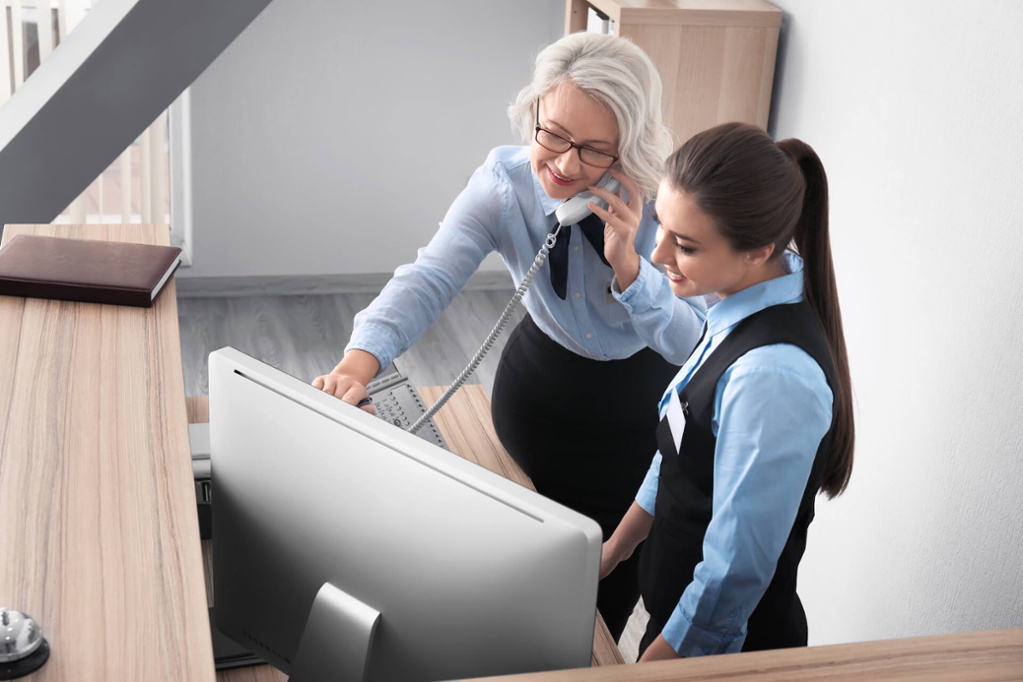
Initial processes in the late 40s through the 50s focused solely on hotel reservations, which left numerous pieces of operation still to be manually completed by hotel staff. Each task was accomplished separately, leaving room for error, miscommunication, and other challenges.
But these systems quickly began to expand, particularly through the late 80s and 90s with the invention and initial implementation of the internet. As these management systems became more robust through technological advancements over the decades, other aspects of the guest experience were taken into consideration, such as the check-in process, amenities, and other critical operations.
While innovations became available and technology advanced, new problems arose, such as:
Ineffective Staff Processes
Without streamlined communication between employees, there is significant room for error. Whether a guest's request isn't completed in time or housekeeping does double the necessary work since they don't have access to previous notes, ineffective communication and other staff processes will cost your business time and money.
Limited Functions Per Platform
Some businesses find themselves with an overwhelming amount of separate software that each solves just one or two problems. As each of these advances, many properties find themselves with overlapping functionalities across their numerous software programs. These businesses still need each platform for one or two functions, making daily operations a hassle.
Siloed Data
For businesses that want to examine and utilize their data, they find that different pieces of information are stored separately, with no way to cohesively analyze all of this data. This perpetuates a lack of data-driven business decisions surrounding everything from marketing to preferred guest experiences.
To solve these issues (among others), property management software providers began looking to connect everything hotels and resorts needed in one centralized platform.
Chapter 2: Moving to the Cloud
One of the largest changes during the evolution of property management is the move to the cloud for data storage.
Cloud computing is a continuously growing market that has impacted several industries, including hospitality. For example, Techjury found that “61% of businesses migrated their workloads to the cloud in 2020.” Organizations that haven't made the switch may be wondering what they are missing due to the rapid growth of cloud computing transitions.
Here are 5 benefits that organizations frequently see with the cloud:
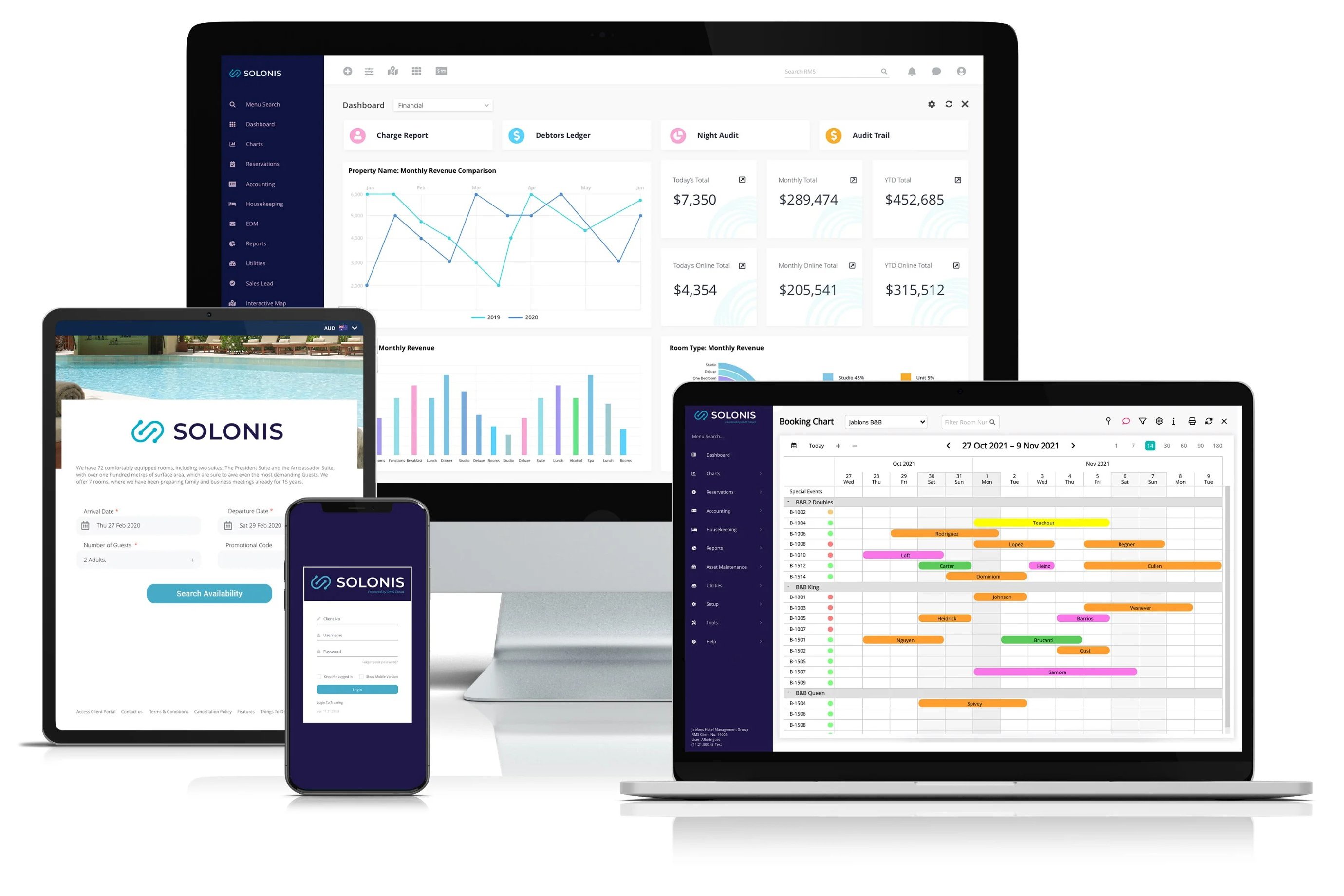
Gone are the days of accidentally losing written records, files, and other important information. The cloud provides you with the opportunity to securely save all staff, guest, and business data within the platform. In addition, top cloud-based property management platforms will also continuously implement best security practices to ensure your data is always protected.
In many cases, cloud-based platforms save businesses money in part due to the consolidation of multiple platforms into one, centralized software that meets all of a business’s needs. It also allows automatic updates from the provider, whereas previous on-premise solutions would have required hospitality teams to manually make updates.
If you own, operate, and manage more than one property, you automatically have several unique challenges, including more difficult data insights, dependencies, and duplicate guest profiles. With certain cloud-based property management systems, your business can have centralized features that are specifically designed to support multi-property enterprises.
If your software is only available to you while you’re on location at your property, you’re unable to stay consistently connected to your property and its operations. With cloud-based property management software, you can have the flexibility to update your rates, check on your property’s night audit, and more, all while you’re working from your home office.
The use of cloud-based property management software has given organizations the edge over their competition for hotels, resorts, vacation rentals, and corporate housing properties.
Certain features help your property stand out from the competition, but with so many options in the marketplace, it can be difficult to know exactly what your business needs.
So, what features should you look for with a modern property management system?
Reservation Management
We’ll start with where these systems began: reservation management.
Whether your staff is managing booking a single room for someone for one night or an entire block for a massive family reunion, the booking process should be simple, clear, and allow them to effectively manage every reservation with ease.
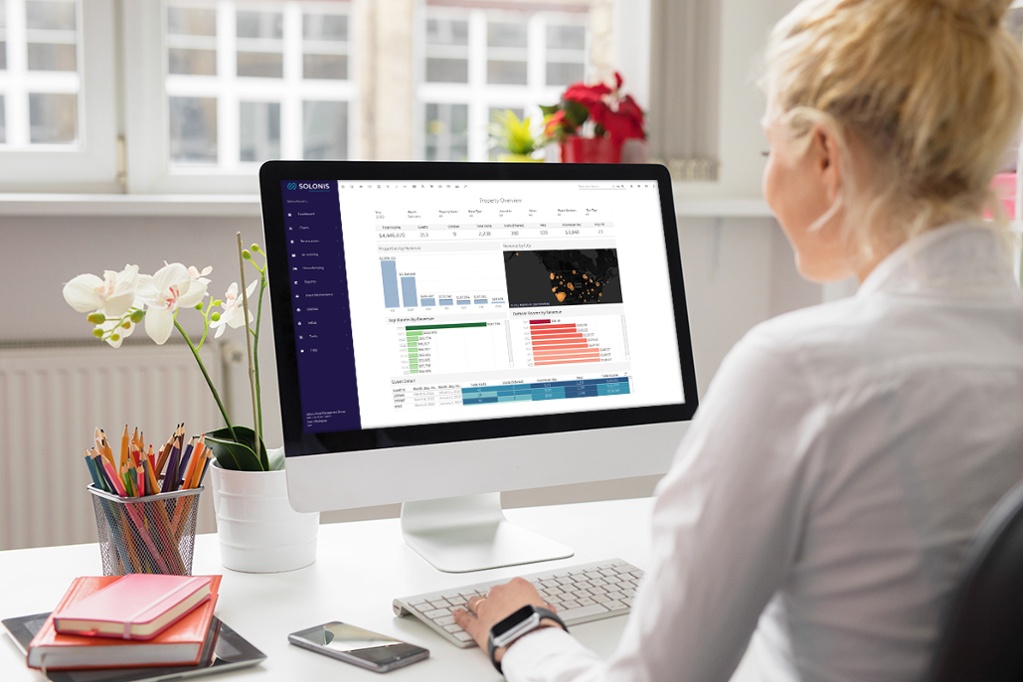
Business Intelligence
Your property can collect significant amounts of guest data, which can help you provide the ideal, personalized service that modern travelers expect.
With consistent access to your data and robust reporting, you can make informed decisions with certainty, allowing you to effectively plan for the future of your property.
Complex Rate Management
Whether you’re looking to configure seasonal rates, update your property’s nightly rates across OTAs, or implement a promotional price, you need the ability to seamlessly make these changes.
An effective way to manage rates is through a complex rate management tool that may be built into your hospitality management system. This allows you to quickly adjust your pricing to attract guests and boost your profit all year long.
Enhanced Communication
You’ll also want to look for tools that allow you to improve communication internally and externally. Whether one of your staff members is communicating with a fellow team member or a guest, improved tools can reduce miscommunications, improve response time, and increase your team’s overall efficiency.
Guest Portals
Empower your guests with the option to manage their own experience through a guest portal. Many top property management systems permit the ability to view, manage, and edit their reservations, as well as pay any remaining balance on their account.
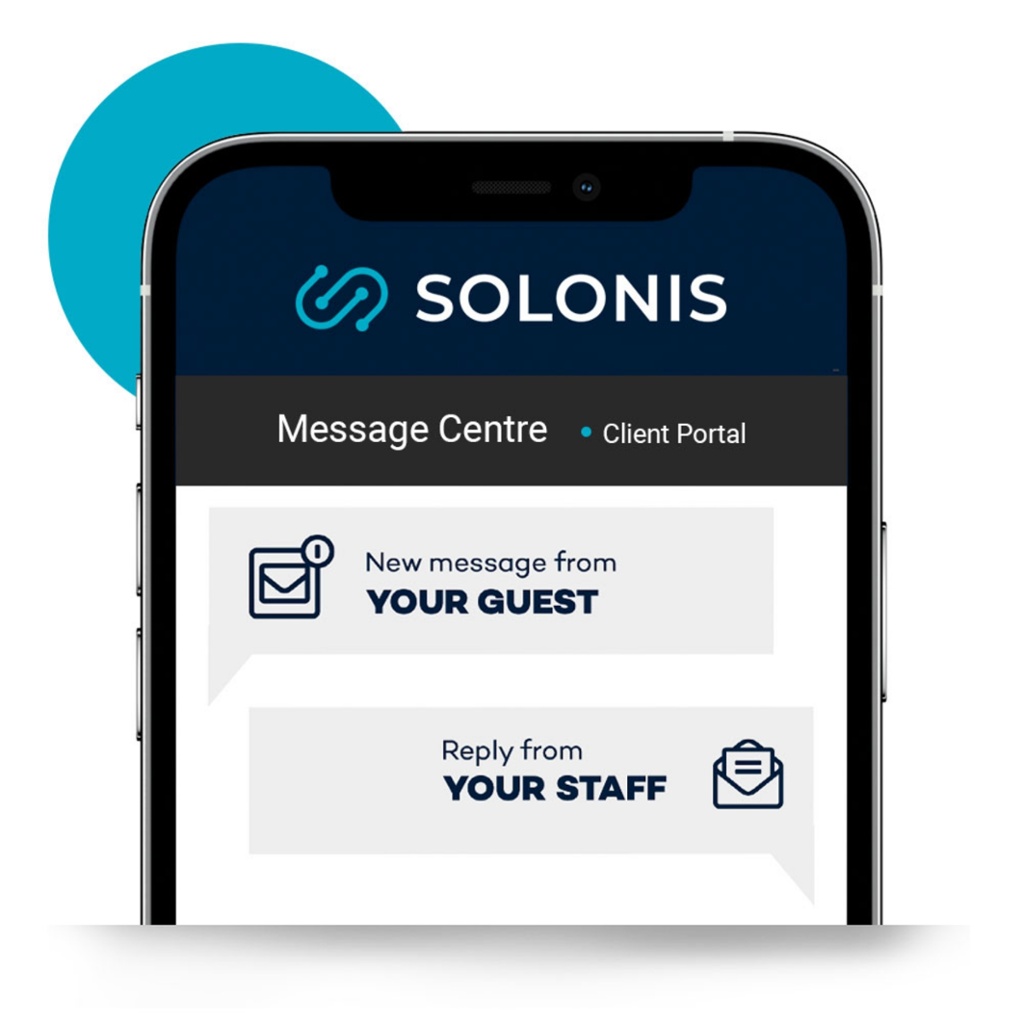
Hospitality Trends Implementation
Modern hospitality management systems should consistently improve to give you the ability to implement hospitality trends at your property. Current trends that are likely going to stick around for the long haul include:

- Self-managed reservations through guest portals, which empowers your guests to take control of their stay, make payments, and more.
- Contactless check-in and check-out allow guests to enjoy their stay on their schedule while maintaining their preferred level of social distancing.
- Personalized experiences for your guests to feel welcome and taken care of at your property. Forbes reported that “80% of consumers are more likely to make a purchase from a brand that provides personalized experiences.”
In addition, top platforms will offer a staff portal that empowers your entire team to stay connected with each other, no matter what role they play at your property.
Open API
The right platform should allow you to extend your functionality through an open API.
Whether you want to connect with systems you already use and love or give a new tool a try, an open API provides the flexibility to integrate with accounting tools, payment management systems, and more.
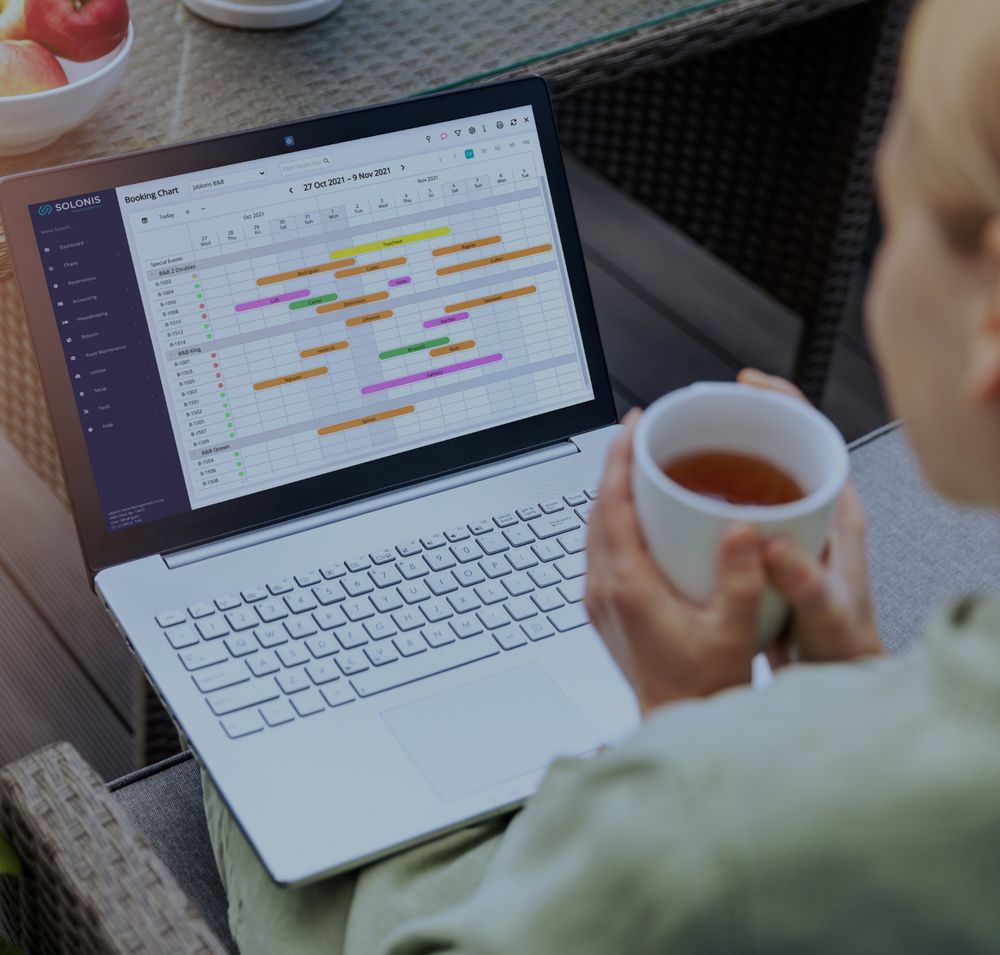
Operations Management
Overall operations management is one of the most critical components of any modern hospitality management system.
You’ll want a platform that provides you with the ability to conduct night audits, oversee event management, manage chain participation, and more – all in a centralized platform. Some beneficial features include:
- Front office management tools
- A housekeeping module
- An up-to-date rooms manager
In addition, top platforms will offer a staff portal that empowers your entire team to stay connected with each other, no matter what role they play at your property.
Upsell Functionality
Upselling to your guests is a fantastic way to increase your revenue — and your hospitality management system should provide you with ways to simplify that process.
By implementing upgrade opportunities throughout the reservation process, guests will be able to select options that enhance their experience without feeling like they're being directly “sold to” by your staff. In addition, these digital sales save your team time, so they can focus on creating an incredible guest experience.
Whether you’re running a hotel, resort, vacation rental, or corporate housing location, you need a property management system that meets your needs today — and is ready to evolve with your business as it grows in the future.
Solonis is the modern, cloud-based property management system that delivers everything you need to streamline your business. Designed and powered by hospitality professionals with decades of experience in the field, Solonis is designed to help you grow your business.
With a focus on providing properties with the latest technology advancements in hospitality, Solonis users can be certain they’re on the most efficient path to success.

